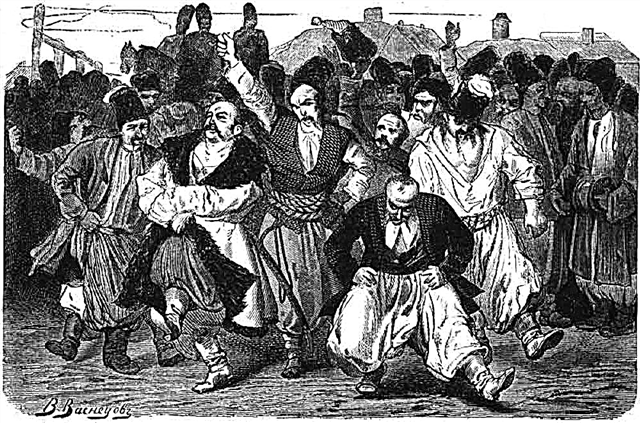: Having become a sovereign, you can be gracious or cruel, honest or deceitful - you have the right to do everything that strengthens your rule. When it comes to power, any means is good.
Nationals must feel significant
Imagine that you rule during the Renaissance and have just conquered a new territory. The population considers you an invader and a stranger, does not want to perceive it as their sovereign. How then to govern the country?
The first rule of the sovereign
Try to be present in new possessions in person. The proximity of the ruler will allow residents to feel their own importance and at the same time scare away enemies.
If you cannot come yourself, send your subjects. So the new subjects will get used to the way of your people and begin to adapt.
Second rule
Always take action to eliminate potential competitors. Protect weak leaders around new possessions, they will gladly join you. Your union can become strong enough to challenge powerful states that can threaten your power.
Third rule
Be mindful of future threats. The disease is easier to cure at the beginning, therefore it is easier to stop rivals at their first attack.
Example: Ancient Romans used this tactic to capture Greece. They did not allow any local leader to become stronger than the others, no matter how loyal he was to the Romans.
And the king of France, Louis XII, having captured Northern Italy, quickly lost control of it, violating all the above rules. Do not repeat his mistakes.
The state is either easy to conquer, but hard to control, or hard to conquer, but easy to control
When Alexander the Great died after the conquest of the Persian kingdom, everyone thought that without him, the Macedonians would quickly lose control of the Persians. But they managed to maintain their power for many years. How?
To answer this question, consider various types of states.
Baron ruler system
Example: In France, the king ruled the country through many nobles (they were called barons), who had a personal interest. Such an unstable system leads to fragmentation of the state. Occasionally, barons can even challenge the king’s power.
It is easy to conquer a country with such a system: it is enough to lure several barons to your side. But in the future you will get the same troubles as your predecessor.
Servant Ruler Relations
The sovereign begins his reign by eliminating people with political ambitions. Only those who sincerely support the ruler and his plans remain. This creates a cohesive state that renders stiff resistance to the invaders during the invasion.
Example: When Alexander conquered Persia, she had this system of government. King Darius abolished all institutions and forced leaders to faithfully follow him. Therefore, Alexander had to fight fiercely to conquer Persia, but after his death in the country there were no independent rulers who could start a coup.
Only you choose which system to apply in your state. Each has its own advantages, so you need to decide on the basis of specific circumstances and your capabilities.
The acquisition of new states depends on good luck and merits
The ruler can gain control of the state in two ways: the army and international agreements.
Regardless of the method, a combination of great virtues and a happy occasion is required.
Even the most gifted ruler needs a little luck to use his dignity. Capturing a city or kingdom with the help of the army demonstrates your courage, spiritual strength, character and leadership.But all this is useless if luck is not on your side.
Example: Romulus incident forced him to leave the city of Alba in infancy, thereby pushing him to begin Rome. If he had not been forced to leave Alba, he could eventually become a farmer, unable to show his positive aspects.
But the opposite is also true: if fate favors you, you will have to prove yourself in order to use it.
Example: If an influential patron is favorable to you, you can become a sovereign just by a fluke. But in the new state, your opponents will be stronger than supporters, because the former are aimed at your overthrow, and supporters do not know what to expect from you.
You will have to act quickly and with dignity to lay the foundations of a long reign. Take control of the nobility in the state and create your own army. Without these precautions, you will quickly be overthrown.
Crime and popular support will help to become a sovereign
Example: In 317 BC e. a man named Agathocles, son of a potter, gathered an army of mercenaries and took Syracuse (Sicily). Despite his vow to abide by a democratic Constitution, he killed 10,000 of his opponents and became a tyrant.
Crime is one way to gain power. Cunning and ruthlessness will help gain control of the state.
But cruelty only works if applied correctly. Cruelty must be swift - deliver one merciless blow. At first, the people will be very indignant. Gradually reduce the amount of violence, calming the population. That is what Agathocles did, and he managed to maintain power.
Conversely, excessive decency at the beginning of the reign and a gradual increase in cruelty are not reasonable tactics.
Power can also be obtained by protecting citizens and gaining support from them. You need to help people become wealthy enough to want to support you. “Sufficient security” depends on what people are used to.
Example: If people were slaves before, they will be happy, having gained freedom.
The main goal is to make citizens feel indebted. If this happens, they will keep you in power, even if you have to endure hardships. Under power through terror, people do not feel indebted.
Cruelty is easier to achieve power, but power based on the support of the population is more stable.
Every sovereign must own the art of war
Diplomacy is a useful tool, but when it comes to fighting, an unarmed person will always obey an armed man. The art of war is necessary to become and remain a sovereign.
Even in peacetime, it is important to develop military skills, because through war it is most likely to lose the state.
Troops play a key role: good laws and institutions are impossible without protection from a strong army.
War is necessary to maintain power, so keep your army and yourself — your physical and mental abilities — constantly in combat.
Example: Each time during the hunt, study the landscape of your possessions and think about how to use the terrain to form a defense in war.
The experience of the great masters helps prepare for war. All the great commanders learned from their predecessors: Alexander of Macedon from Achilles, and Caesar imitated Alexander.
It is important to be a good leader in peacetime, but we must not forget that fortune is changeable. War can fall on the state, and the only way to maintain power is to prepare for it.
The army of the state should consist of its citizens
What do the Romans, Spartans and Swiss have in common?
These countries had a well-armed population, which allowed them to remain independent for centuries. Only armies from local residents can effectively defend the state.
Mercenaries, that is, independent troops fighting only for money, are useless.They are not interested in the survival of the state, so they can run away in battle if they feel that it’s not worth dying for money.
Mercenaries will rob you in peacetime, and in war will allow your opponent to do the same. And even if you are lucky enough to find a capable mercenary commander who is ready to fight for you, sooner or later he will realize that he can easily overthrow you as well.
Example: In the 15–16 centuries, Italy repeatedly relied on mercenaries and was conquered by the French kings, and later occupied by Ferdinand of Aragon, when the mercenaries fled the battlefield headlong.
Another mistake is to rely on auxiliary troops of the allies. As soon as foreign troops enter your land, you risk never getting rid of them.
Example: Greece let 10,000 Turkish soldiers into its land to defend itself against its neighbors. When the war ended, the Turks refused to return home and, as a result, occupied Greece for several centuries.
You will lose, relying on auxiliary troops: if they win, your state will fall, and if they win, they will remain and enslave you.
The only way to protect the country is to create an army of its own citizens.
The sovereign must harmoniously combine generosity and stinginess
Nationals expect certain behavior from their ruler.
Personality traits, such as politeness or generosity, are important for the stability of the state. Moreover, qualities that are positive for the average citizen may not be so for the sovereign.
Take the bounty. A generous person is loved by everyone, but if a ruler, striving for such a reputation, starts spending everything you can afford, people will quickly get used to it. We'll have to constantly shower gifts with citizens, which will quickly drain the treasury. It will be necessary to increase the tax burden, which will nullify all the benefits of generosity.
To be a successful sovereign, one must balance generosity and greed.
Show generosity to gain power, especially in states where citizens can choose a ruler.
Example: So Caesar became the ruler of Rome: he spent a fortune on “bread and circuses” to increase his popularity.
But already becoming a sovereign, show stinginess and gradually increase expenses to strengthen popularity without getting into financial troubles.
Example: As soon as Caesar received the desired position, he tempered his generosity so as not to bankrupt the empire.
In the long run, citizens will be more satisfied if you set low taxes. Therefore, stinginess in order to reduce taxes is better than generosity.
Successful sovereign can use cruelty to his advantage
One of the greatest threats to the Roman Empire was the war launched by Hannibal and his Carthaginian army. Hannibal's success is credited with his cruelty. Properly applied cruelty will benefit you.
Example: Hannibal crucified his own scouts for providing incorrect information. He instilled fear in the soldiers, thereby rallying them in difficult times.
Every sovereign wants to look gracious and fair, but in order to maintain power and unite citizens, he must inspire awe.
It is better for the ruler to be feared rather than loved. We all know that promises based on love are constantly being violated, so a too merciful sovereign can be used for the sake of one's own interests. But fear of harsh punishment will always be a deterrent.
And isn’t it merciful to provide security with the cruel punishment of lawbreakers?
Cruelty is especially effective in managing an army: soldiers admire a certain degree of viciousness and admit that it is necessary for discipline. Hannibal's success is an example of the correct use of cruelty.
Use cruelty to your advantage, but do not go too far so as not to cause hatred of citizens.Try to find a balance. Do not punish innocent residents, do not take away their property for no reason - this is how people will rally against you, creating instability in the state. Best to make them satisfied and somewhat fearful.
Successful sovereign knows when to use deception and hide it
If you ask the ruler what animal he identifies with, the lion will often be the answer. Yes, lion power is an important quality, but the ruler also needs the trick of the fox.
How to imitate a fox? Making promises, you should not always keep your word.
Honesty is important because laws and treaties are the foundation of government institutions. But, like a sly fox, you should know when you can neglect principles in favor of your own interests.
Example: If a rebel leader gives you trouble, why not invite him to peace talks and punish him? This will cleverly solve the problem.
If conscience wakes up in you, remind yourself that other people often do what is beneficial to them, despite these promises.
Just make sure that citizens do not see the insidious side of your personality. You can be a “wolf in sheep's clothing”, but you must create the impression of a bona fide ruler who shares religious and human values.
But in the international arena, be absolutely honest. If relations between two states are strained, it is necessary to quickly choose one side and maintain it.
Indecision is the worst option, because the winner of the conflict will attack you, because you clearly did not support him.
The presence of obvious allies and opponents brings clarity to your own situation, and makes you act decisively. A real sovereign always manifests himself either as a devoted friend, or as a sworn enemy.
Sovereign must have good advisers
History knows many great leaders, but all of them, at one time or another, needed advisers. No man can be a "jack of all trades." The way the ruler recruits advisers and works with them speaks of his leadership abilities.
The quality of advisers depends only on the sovereign. You know better in which areas you lack knowledge, so it’s wise to select the right advisers and ministers.
Having decided, maintain good relations with the ministers so that they serve your interests. But keep an eye on them all the time. If you see someone acting for their own benefit, immediately fire him. Those who serve you faithfully should receive a generous reward - sufficient so as not to provoke them into intrigue behind you.
Also, the sovereign must be able to ask for advice. Counselors should know that you value honest opinions and will not punish them for the truth. Otherwise, you will hear only deceptive flattery or embellished truth. If a person does not want to speak, then he is clearly trying to hide something.
But do not listen to advice unconditionally: if you allow ministers to give advice without your request, people will quickly begin to question your decisions. Make it clear that only you decide when to seek advice.
Take action - don't rely on chance
You may think that advice on how to succeed as a ruler is meaningless, since the fortune and God decide the fate of any sovereign.
But you can influence your future.
God endowed us with free will. We are able to make decisions and, thus, influence our destiny. Half of the future is in the hands of fate, but the other half depends on our actions!
Luck is important for the success of the sovereign, but you can protect yourself, prepare for the situation when she turns away.
Example: Imagine that your luck is a river that flowed quietly for many years, making your fields fertile. You need to build dams from future disasters.So, if the “river” turns into a flood, you will suffer, but not perish.
It is impossible to prepare for each twist of fate: some of them are simply unpredictable. Do not try to foresee the future, but create it! The best way to do this is to be courageous, not careful.
Example: Father Julius II wanted to start a war against Bologna. He did not wait for the consent of his allies and immediately sent troops to the city. Venice and France could not object, and the campaign was a great success.
Machiavelli argues that one should think of luck as a woman, meek and obedient, preferring a young energetic husband, rather than a cautious thinker.
The most important thing
The emperor should read historical books and analyze the actions of prominent people. Take a closer look at how they behaved in the war, what are the reasons for their victories and defeats. Try to imitate their example and avoid their mistakes.
Great things were done by those sovereigns who knew how to fool people with their tricks. It is commendable for the emperor to keep his word. But experience shows that sovereigns who cared little for this word prevailed over those who relied on honesty. Remember that lion power is good, but the trick of a fox is just as important.
Generosity is expensive. To maintain the title of generous, you will constantly have to give citizens. And when resources are depleted, it will be necessary to raise taxes, which will cause hatred among the people, and as a result, you will still be considered stingy. It is wiser to initially show stinginess and gradually increase spending.

 Why do we buy
Why do we buy









